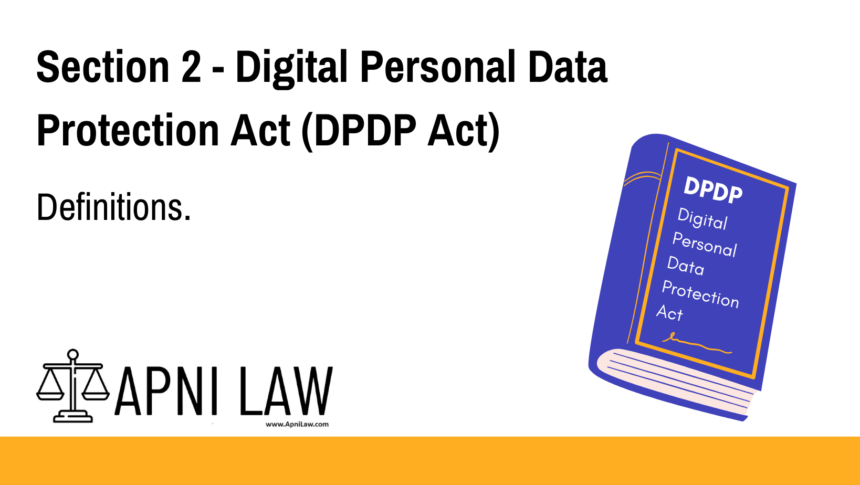Code
In this Act, unless the context otherwise requires,—
(a) “Appellate Tribunal” means the Telecom Disputes Settlement and Appellate
Tribunal established under section 14 of the Telecom Regulatory Authority of India
Act, 1997;
(b) “automated” means any digital process capable of operating automatically
in response to instructions given or otherwise for the purpose of processing data;
(c) “Board” means the Data Protection Board of India established by the Central
Government under section 18;
(d) “certain legitimate uses” means the uses referred to in section 7;
(e) “Chairperson” means the Chairperson of the Board;
(f) “child” means an individual who has not completed the age of eighteen
years;
(g) “Consent Manager” means a person registered with the Board, who acts as
a single point of contact to enable a Data Principal to give, manage, review and
withdraw her consent through an accessible, transparent and interoperable platform;
(h) “data” means a representation of information, facts, concepts, opinions or
instructions in a manner suitable for communication, interpretation or processing by
human beings or by automated means;
(i) “Data Fiduciary” means any person who alone or in conjunction with other
persons determines the purpose and means of processing of personal data;
(j) “Data Principal” means the individual to whom the personal data relates and
where such individual is—
(i) a child, includes the parents or lawful guardian of such a child;
(ii) a person with disability, includes her lawful guardian, acting on her
behalf;
(k) “Data Processor” means any person who processes personal data on behalf
of a Data Fiduciary;
(l) “Data Protection Officer” means an individual appointed by the Significant
Data Fiduciary under clause (a) of sub-section (2) of section 10;
(m) “digital office” means an office that adopts an online mechanism wherein
the proceedings, from receipt of intimation or complaint or reference or directions or
appeal, as the case may be, to the disposal thereof, are conducted in online or digital
mode;
(n) “digital personal data” means personal data in digital form;
(o) “gain” means—
(i) a gain in property or supply of services, whether temporary or
permanent; or
(ii) an opportunity to earn remuneration or greater remuneration or to
gain a financial advantage otherwise than by way of legitimate remuneration;
(p) “loss” means—
(i) a loss in property or interruption in supply of services, whether
temporary or permanent; or
(ii) a loss of opportunity to earn remuneration or greater remuneration or
to gain a financial advantage otherwise than by way of legitimate remuneration;
(q) “Member” means a Member of the Board and includes the Chairperson;
(r) “notification” means a notification published in the Official Gazette and the
expressions “notify” and “notified” shall be construed accordingly;
(s) “person” includes—
(i) an individual;
(ii) a Hindu undivided family;
(iii) a company;
(iv) a firm;
(v) an association of persons or a body of individuals, whether
incorporated or not;
(vi) the State; and
(vii) every artificial juristic person, not falling within any of the preceding
sub-clauses;
(t) “personal data” means any data about an individual who is identifiable by or
in relation to such data;
(u) “personal data breach” means any unauthorised processing of personal
data or accidental disclosure, acquisition, sharing, use, alteration, destruction or loss
of access to personal data, that compromises the confidentiality, integrity or availability
of personal data;
(v) “prescribed” means prescribed by rules made under this Act;
(w) “proceeding” means any action taken by the Board under the provisions of
this Act;
(x) “processing” in relation to personal data, means a wholly or partly automated
operation or set of operations performed on digital personal data, and includes
operations such as collection, recording, organisation, structuring, storage, adaptation,
retrieval, use, alignment or combination, indexing, sharing, disclosure by transmission,
dissemination or otherwise making available, restriction, erasure or destruction;
(y) “she” in relation to an individual includes the reference to such individual
irrespective of gender;
(z) “Significant Data Fiduciary” means any Data Fiduciary or class of Data
Fiduciaries as may be notified by the Central Government under section 10;
(za) “specified purpose” means the purpose mentioned in the notice given by
the Data Fiduciary to the Data Principal in accordance with the provisions of this Act
and the rules made thereunder; and
(zb) “State” means the State as defined under article 12 of the Constitution.








